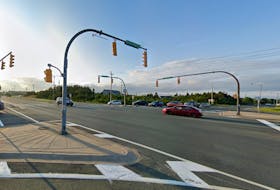As customers rolled on and off the Firewood Factory lot on Torbay Road in St. John’s, owner Luke Janes told The Telegram electricity prices have been coming up in conversation.
New customers are coming through talking about rates, he said. That’s with the worst hikes still ahead, when the $12.7-billion Muskrat Falls hydroelectric project comes online.
“If they haven’t got a stove, they’re talking to woodstove suppliers, looking to switch over to wood,” he said, adding he expects to hear more as the bigger electricity bills arrive.
“A lot of people are reaction based. When they see the bill then they’ll do something about it,” he said.
It’s anecdotal, but the potential for prices to drive consumers to new power sources — reducing overall demand on the energy grid — is being considered by the Public Utilities Board (PUB) as part of ongoing rate hearings.
Consumer Advocate Dennis Browne has spoken critically of Newfoundland and Labrador Hydro for not presenting an elasticity study for provincial power prices to the PUB, to give at least a rough understanding of what changing power costs could do to local electricity demand.
He asked economist and Memorial University of Newfoundland professor James Feehan to take a look, and The Telegram has obtained a copy of the report prepared by Feehan, to be filed with the PUB.
“It shows that there’s clear limits to how much you can raise the price,” Feehan said, speaking briefly about the report Thursday.
RELATED STORIES
People peeved at power rates protest at PUB
BRIAN JONES: Power problems John Cabot didn’t foresee
It suggests a price increase to 18 cents per kilowatt hour (kWh), as recently discussed as a possibility at the PUB, can be expected to still dramatically reduce power demand.
“You wouldn’t have needed Muskrat Falls in the first place if you raise rates to these levels,” he said, “because no one would be considering the power anyway. But the reality is the project has been done and the power is going to be here, so you may as well price it in a way so that people will actually use some of it.”
The report includes a look at various “fuel” costs (electric baseboard, electric heat pump, propane and wood stoves in varying efficiencies), comparing heating bills under three different scenarios — 11.4 cents per kWH electricity, versus the forecasted 23 cents per kWH, and a suggested mitigated price of 17 cents per kWh (around where the provincial government has said prices might be kept).
The cost of the different fuel options was considered for each scenario, for a theoretical 2,000-square-foot detached home, built after 1990 in St. John’s. Estimates were developed using more than two decades of electricity usage data.
The findings suggest electric baseboard heat for the home moving from $3,074 annually to a high of $6,202 if electricity prices go to 23 cents per kWh, or to a lower $4,584 if the rates are kept to 17 cents per kWh through provincial government intervention.
In comparison, the same home using electricity but for mini-split heat pumps could be expected to start at $1,230 annually, moving to $2,481 at 23 cents per kWh or just $1,834 at 17 cents per kWh.
It doesn’t include the up-front cost for the heat pump, Feehan notes, but the difference in long-term costs between one source versus the other makes a switch from baseboard heating to heat pumps an incentivized option for consumers.
“They all become pretty attractive options if your electricity costs start going up like has been talked about,” he said, referring to the other demonstrative figures for propane, oil and wood heat.
“At present, approximately 70 per cent of residential customers on the island of Newfoundland have electric space heating. Thus, there is considerable room for reductions in (overall) residential electricity consumption,” he notes in the report.
It goes on to offer values for the potential change in overall power demand, noting there are plenty of variables such as price of alternative fuels, new technologies and demographics can affect overall electricity consumption. But Feehan said there’s also little time for major shifts in many variables before the big bills hit.
He suggested the changes ahead could push people to reduce their electricity usage enough that Holyrood could be “largely or even totally unneeded,” even without Muskrat Falls power imports.
There’s no magic electricity price he could offer to make everything OK, he said.
It’s something that requires more work in quantifying what lies ahead, and the options.
“This goes back to a broader issue of properly designing rates. You want the rates designed in a way that people won’t abandon the system or move away from the system on a large scale,” he said.
“And you really need some sort of maybe special reference to the PUB or some sort of task force of experts to try and sort that out,” he said.
The Consumer Advocate and Progressive Conservative Leader Ches Crosbie have both called for a special reference by government to the PUB under the Electrical Power Control Act for the purpose of considering the integration of Muskrat Falls costs into power rates, and what comes next for the province.
The provincial government has yet to detail its rate mitigation plans.
The Muskrat Falls hydro project is expected to be completed in the third quarter of 2020.









